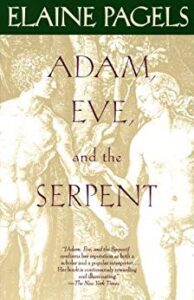Author: Elaine Pagels
Publisher: Vintage
Year Published: 1989
In this book review, I will summarize the main arguments of Adam, Eve, and the Serpent by Elaine Pagels, a professor of religion at Princeton University. The book explores how the Genesis creation story of Adam and Eve influenced the views and practices of gender and sexuality in Christianity from the first to the fourth centuries.
How Jews, Jesus, and Paul Interpreted Genesis
Pagels begins by explaining how Jews during Jesus’ time understood the story of Adam and Eve. They saw it as a narrative of human freedom and responsibility, not as a tale of sin and punishment. They believed that God created humans in his image and gave them free will to choose between good and evil. They also believed that God blessed marriage and procreation as a way to fulfill his command to be fruitful and multiply.
Pagels then examines how Jesus and Paul adopted and modified some of these Jewish interpretations. She argues that both Jesus and Paul affirmed the value of marriage and family, but also challenged some of the traditional norms of their society. For example, Jesus criticized divorce and adultery, while Paul advocated celibacy and equality between spouses. They also rejected polygamy, homosexuality, prostitution, and abortion, which were common among pagans.
How Early Christians Distinguished Themselves from Pagans and Gnostics
Pagels continues by showing how early Christians used the story of Adam and Eve to differentiate themselves from pagans and Gnostic Christians. Pagans were those who followed the Roman religion and culture, which was seen as corrupt and immoral by Christians. Gnostics were those who claimed to have a secret knowledge of God and the spiritual world, which was seen as heretical by orthodox Christians.
Pagels argues that early Christians emphasized sexual restraint and purity as a way to demonstrate their loyalty to God and their opposition to paganism. They also used the story of Adam and Eve to support their doctrines of creation, resurrection, and salvation. They believed that God created humans good, but they fell into sin through disobedience. They also believed that God sent his Son, Jesus Christ, to redeem humans from sin and death. They also believed that God would raise them from the dead at the end of time.
Pagels illustrates these points by analyzing some of the popular texts and figures of early Christianity. For instance, she discusses the story of Paul and Thecla, a fictional account of a young woman who followed Paul’s teachings on celibacy and became a missionary. She also examines the writings of Justin Martyr, Clement of Alexandria, and Tertullian, who defended Christianity against pagan accusations and promoted Christian ethics.
How Jerome, Jovinian, and Augustine Debated over Abstinence
Pagels concludes by tracing how the story of Adam and Eve sparked a heated debate over abstinence in the fourth century. She focuses on the controversy between Jerome, a famous scholar and monk, and Jovinian, a lesser-known priest. Jovinian argued that all Christians were equal in God’s sight regardless of their marital status or dietary habits. He claimed that celibacy was not superior to marriage, nor fasting to eating. He based his views on Paul’s writings, which allowed for diversity among Christians.
Jerome vehemently opposed Jovinian’s views. He argued that celibacy was superior to marriage because it enabled Christians to devote themselves fully to God. He also argued that fasting was superior to eating because it helped Christians control their passions. He based his views on Jesus’ teachings, which praised virginity and poverty. He also used the story of Adam and Eve to support his arguments. He claimed that sexual desire was the result of sin and that marriage was a concession for the weak.
Pagels also discusses how Augustine, another influential theologian, developed his own theory of original sin based on the story of Adam and Eve. Augustine converted to Christianity later in life after struggling with his own sexual desires. He believed that sexual desire (libido) was the direct result of Adam and Eve’s sin of disobedience. He also believed that all humans inherited this sin from their parents through sexual intercourse. He argued that only baptism could cleanse humans from original sin.
Conclusion
Pagels writes with clarity and insight, making complex ideas accessible to general readers. She shows how the story of Adam and Eve shaped Christian views on gender and sexuality throughout history. She also reveals how different interpretations of this story reflected different social contexts and theological agendas.
I highly recommend this book to anyone interested in learning more about Adam and Eve Pagels: how the Genesis couple influenced Christianity’s views on gender and sexuality.











 The Devil by Amelia Wilson: A Fascinating History of Satan in Art and Culture
The Devil by Amelia Wilson: A Fascinating History of Satan in Art and Culture